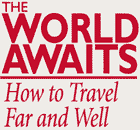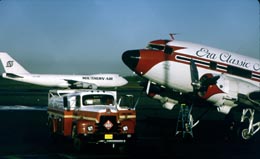|
|
| w o r l d a w a i t s . c o m |

|
Passport, visas, shots, tickets, business, insurance, etc. Have you got plenty of time to prepare? Not so much time? Leaving tomorrow? There are wise ways to deal with any schedule and set of needs. Excerpts from the book will anchor an exacting look at how to board that first flight ready for everything. Three primary tasks qualify as must-do-in-advance items for journeys to many parts of the world.
While there are last minute ways to deal with them, start well ahead of time: Your Passport While Mexico and Canada don't require Americans to have passports for entry, most other nations do. European Union citizens enjoy passport-free travel in Europe, but will need a passport to leave the continent. Passport requirements in the U.S. are straightforward. Here are the basics distilled from the richer look taken in the book: 1. Be or become a citizen of the U.S. 2. Obtain your birth certificate. If you don’t have it or can’t find it, contact the appropriate office in the state in which you were born to get an official copy. If you’re a naturalized citizen, you’ll need your citizenship or naturalization papers. 3. Get some passport photos taken. Get a dozen or more prints. You’ll need one or two for many visas you get as well as two for the passport. You might want a mix of black-and-white and color. Black-and-white photos are cheaper and are accepted many times—preferred sometimes. You can get additional photos for later visas in hundreds of places overseas.
4. Find and go to the right office with your official birth certificate or proof of citizenship, two passport photos, a valid driver’s license or ID, and $65. Apply at an official U.S. passport agency office (located in a dozen major cities), or at one of many post offices and county courthouses that handle applications. In “up to four weeks,” your passport will arrive in the mail. You can pay $30 extra for rush service (you’ll need to show tickets or other proof of imminent departure). Visas Most nations require that you have a stamp in your passport proving that you are approved for entry for a designated purpose and registered for a stay of a certain length of time. That’s a visa. Unfortunately, there’s a circus of variations regarding how, when, and where you get those visas. Visa requirement info is available at libraries and travel agents, in regional and national guidebooks, through embassies and consulates (see Embassies and Consulates in the U.S.), and elsewhere.
In most countries where visas are required, you can get one—either at the country’s border or outside the country at one of its foreign embassies or consulates. Unfortunately, for some nations, you must obtain a visa through an embassy or consulate in your home country before you leave. Plan carefully...
Sound like a pain? Well add these to the mix:
But don't despair. Visas can often be extended and/or modified in the issuing country. Begging at borders for a bending of the rules has worked once or twice to get me across. In some places, an appropriately targeted bribe works wonders. You might even consider paying a visa service a hefty fee to solve problems and take on the headaches for you. The book is loaded with details, tips, and strategies for maximizing convenient access around the globe and minimizing expense, delays, and roadblocks. Medical Preparation Get the shots and pills that your research reveals you should. Check out the latest info at Centers for Disease Control and Prevention site (CDC). For a great one-stop review of travel disease information, hit the Medical College of Wisconsin site. Vaccines Travel vaccines or boosters that might be required or advised in addition to your 'standard' childhood shots include the following (the answer to the question, “Should I get this shot?” is included in italics). Some of them come in a series requiring two or three trips to the clinic, so start at least two months in advance. NOTE -- All the disease and shots data presented below has been assembled by me, and I am not a doctor nor a medical expert of any kind. Your travel savvy physician and the CDC are the only sources you should trust for the latest and most accurate information.Diphtheria—Yes if you haven’t had a booster for more than 8 or 9 years. Most of you were immunized as kids but might need a booster. It often comes mixed with a tetanus booster.
Other vaccines worth investigating include the following:Cholera—Maybe, for travel in developing countries. The World Health Organization says the vaccination is only about 50 percent effective.
Some sources also mention paratyphoid, influenza, and pneumonia as diseases that travelers should consider for inoculation. The “Yellow Card”
Malaria This common, debilitating, occasionally deadly parasitic disease is found throughout the tropics and developing world, and is carried by a particular kind of mosquito. You can prevent malaria by taking the drug that’s used to treat it. Chloroquine has been the standard for awhile, although resistant strains are on the rise. You will need to start taking Chloroquine tablets two weeks before entering an area where the disease is found and continue taking the drug for six weeks after you’re out. The CDC recommends Mefloquine, Doxycycline, or a Chloroquine/Proguanil combination in Chloroquine-resistant areas. Dental Preparation
The book goes into greater detail on all topics, as well as discussing less official approaches to self-medication and strategies for updating your prevention profile on the road. For a quick reference on Yellow Card and shots recommendations for nations you're considering visiting, check out the Ultralight Handbook for the Road. For up-to-date, detailed coverage, visit the CDC site. Advance Tickets Buying transport tickets in advance seems like a no-brainer, but I like to avoid doing it whenever possible. Having a ticket, or even just a reservation, gives you a sense of security -- the kind of security you may want to avoid for the sake of feeling free and staying spontaneous. Even so, you may want to get your major tickets in advance for several reasons:
Air Tickets Check the weekly travel sections of big city newspapers for discount ticket prices, including round-the-world and other multi-flight routings. Discounted tickets have the same rules and rights as regular excursion fare tickets. On the road, when I reach a point where I can accurately forecast the need for a series of flights, I call my discount ticket source in the states -- Ticket Planet, 1-800-799-8888 -- they set me up and ship the tickets (though I have to spend a chunk for international phone calls and shipping costs). In return for the extra expense, I can keep my options open as I go. If you want your surface travel to be a thread instead of a loop, ask about “open jaws” options that allow you to arrive in one city and return from another. Consider buying a one-way ticket in the U.S. and purchasing your return ticket when you’re overseas. If your destination is simple and certain, check out charter companies. They advertise in travel sections, deal through travel agents, and list in the yellow pages.
Advance Purchase Rail Passes You may find convenience and savings in going the rail pass route -- especially if you're in the "youth" category -- however, the savings are less with short term passes, when your rail mileage is low, when the time blocks don’t match your schedule, and when you're a bit older. It’s entirely possible to lose money buying a pass. Besides, a pass makes you feel financially obligated to use it to its limits, traveling by train exclusively during the pass validity period. You may also travel farther than you might otherwise go, feeling subtly motivated to get your money’s worth and more. Think about it... Still, it can be a joy to solve all your reservation and ticketing problems by buying a pass. I've traveled with and without one -- depending upon my travel purposes. The book examines the pass/no-pass question with care, as well as detailing a variety of rail passes. Eurail passes are the most famous and widely used. Check out Railconnection.com for details on the options -- there are several to suit a variety of Euro-trips. Shop with care so that you get exactly what you need at the best possible price. A big thing to remember about all passes—rail, air, and others—is that you often can’t buy them in the country or region where you use them! Some must be purchased in the U.S., though many may be purchased in a third country Air Passes
Every regional air pass has its own, often hard to decipher set of rules. Spend some quality time with a travel or airline agent to scope out the options. Other Tickets Other passes, packages, and individual tickets can be purchased at home through travel agents, if that agent represents the bus carrier, ferry line, tour company, etc., that you want. Other Advance Work There are no surprises regarding the other things you should take care of well in advance. Here are some excerpts from the list presented in the book:
Return to Chapter 9 |
 Aside from these exceptions, a national passport is basic gear for almost all international travelers.
Aside from these exceptions, a national passport is basic gear for almost all international travelers.